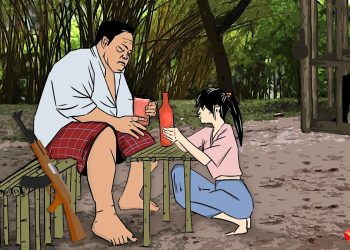SITTWE — Gunshots rang out and residents fled burning homes on Tuesday as security forces in western Burma struggled to contain deadly ethnic and religious violence that has displaced thousands of people.
The conflict pitting ethnic Arakanese Buddhists against Rohingya Muslims has left at least a dozen civilians dead and hundreds of homes charred since it began in coastal Arakan State on Friday.
President Thein Sein has declared a state of emergency and deployed army troops to restore stability, warning that the unrest could threaten the fragile nation’s recent democratic reforms as it emerges from half a century of military rule.
On Tuesday in the regional capital, Sittwe, police fired live rounds into the air to disperse a group of Rohingyas who could be seen burning homes in one neighborhood. An Associated Press photographer saw hordes of people running to escape. Police fired skyward again in another neighborhood to separate hundreds-strong mobs wielding sticks and stones.
Much of the port city remained calm, however, including the main street. Schools, banks and most shops were closed, though some opened briefly to sell fish and vegetables early in the morning to residents who braved the tense streets.
“Tensions are still very high and it is very dangerous,” said Tha Zan Hla, an ethnic Arakanese.
The unrest was triggered by the rape and murder last month of a Buddhist girl, allegedly by three Muslims, and the June 3 lynching of 10 Muslims in apparent retaliation. There are long-standing tensions between the two groups.
The government regards the Rohingyas as illegal migrants from Bangladesh and has rendered them stateless by denying them citizenship. Although some are recent settlers, many have lived in Burma for generations and rights groups say they suffer severe discrimination.
The conflict poses one of the biggest tests yet for Burma’s new government as it tries to reform the nation after the long-ruling army junta ceded power last year. The handling of the unrest will draw close scrutiny from Western powers, which have praised Thein Sein’s administration and rewarded it by easing years of harsh economic sanctions.
On Monday, US Secretary of State Hillary Rodham Clinton urged a halt to the violence and called on authorities to conduct a quick, transparent investigation.
The United Nations said it had temporarily relocated 44 of its 150 personnel in Arakan State. Local state television said cargo and passenger boats to Sittwe were suspended.
State-run newspapers reported that 4,100 people who lost homes had taken refuge in Buddhist monasteries, schools and in a police headquarters in the townships of Maungdaw and Buthidaung, both in Arakan State.
Thousands more were reportedly displaced in Sittwe itself, according to an Arakanese political party called the Rakhine Nationalities Development Party. The party is one of the major parties associated with the country’s ethnic minorities, and won 35 parliamentary seats in the 2010 elections.
State media has reported eight dead in Maungdaw, and an AP journalist saw the corpses of four people killed in Sittwe.
UNHCR, the United Nations’ refugee agency, estimates 800,000 Rohingya live in Burma’s mountainous Arakan State bordering Bangladesh. Thousands attempt to flee every year to Bangladesh, Malaysia and elsewhere in the region, trying to escape a life of abuse that rights groups say includes forced labor, violence against Rohingya women and restrictions on movement, marriage and reproduction.
| Dear Readers:The Irrawaddy welcomes your opinions and views on the issue in Arakan State, irrespective of your race, religion or bias. However, we cannot publish and will not tolerate those who use offensive language or racial insults, or those who try to spread propaganda or who incite violence.
Please use this forum respectfully. The Irrawaddy Team |

















